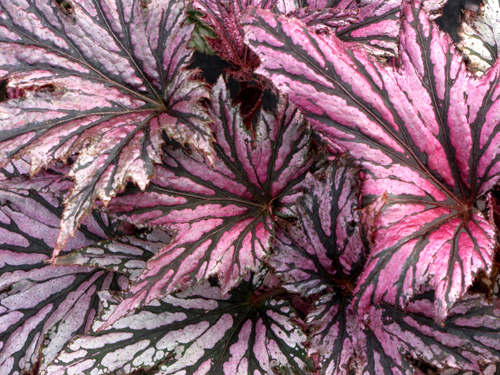
Perennial Solutions: Begonia ‘Garden Angel Blush’
Most growers, landscapers and homeowners are very familiar with begonias that are commonly used as bedding plants. Interestingly, there are approximately 900 species of begonia found throughout the world; of these, two species are perennials in parts of the United States. Many landscapers and gardeners are surprised to learn some begonias are winter hardy and can be effectively used as perennials in some parts of the country.
In recent years, Terra Nova Nurseries Inc. has been breeding and introducing cold-hardy begonias to the industry. Begonia ‘Garden Angel Blush’ is one of its recent decorative and cold-hardy begonia introductions. Once established, ‘Garden Angel Blush’ can tolerate temperatures as low as 38° F without experiencing cold injury.
‘Garden Angel Blush’ produces attractive pewter-silver palmate leaves that somewhat resemble the leaves of a Japanese maple. The foliage contains a violet blush with coal-black veins. ‘Garden Angel Blush’ is best classified as a shrub begonia as it has a mounding upright habit reaching 22 inches high with an 18-inch spread, which produces small single pink flowers in the late summer. They prefer to be grown in moist, well-drained soils in locations with partial to full shade throughout USDA Hardiness Zones 7 to 11. Applying a winter mulch will increase the survivability in borderline areas.
The eye-catching foliage mixes well with hostas, ferns and other shade perennials. In addition to its value as a landscape perennial, hardy begonias perform very well and can be marketed in containers. With the disease problems impatiens have had over the last few years, this hardy begonia would be an excellent and long-term alternative. With its eye-catching foliage and strong garden performance, begonia ‘Garden Angel Blush’ makes a valuable contribution to shady landscapes.
Propagation
Begonia ‘Garden Angel Blush’ is a patented variety and currently is only propagated by means of tissue culture. Since a plant patent is being sought (PPAF – Plant Patent Applied For), unlicensed propagation of this cultivar is currently prohibited.
Production
Hardy begonia are suitable for production in 1-quart to 1-gallon containers. Avoid planting them too deeply; it is best to plant evenly with the soil line in which they were previously produced. They perform best in a growing mix with good water holding characteristics and adequate drainage. Begonia require average to slightly below average amounts of irrigation. When irrigation is necessary, water them thoroughly then allow the soil to dry moderately between irrigations. If possible, avoid overhead irrigation or extended periods of free moisture on leaf surfaces, or leaf disorders may result.
Maintain the growing mix throughout the production cycle with a pH between 6.0 and 6.5. Begonias require moderate amounts of nutrients. Growers using water-soluble fertilizers should either feed with a constant liquid fertilization program using rates of 100- to 125-ppm nitrogen with every irrigation, or apply 250-ppm nitrogen as needed. Controlled-release fertilizers can also be incorporated into the growing mix prior to planting, using the medium
recommended rate or the equivalent of providing approximately 0.8 to 1.0 pounds of elemental nitrogen per yard of growing mix.
Although they can tolerate lower temperatures once they are established, it is necessary to provide temperatures of at least 55° F to maintain active growth. Optimal development occurs with temperatures between 64 and 74° F. Avoid temperatures below 38° F or cold injury may result.
Plant size can often be maintained by keeping the plants slightly dry once they are established, avoiding over-fertilization and providing adequate spacing between the plants. If height control or toning is necessary, spray applications of 2,500 to 5,000-ppm daminozide (B-Nine or Dazide) can be applied at seven- to 10-day intervals just as the plant canopy is beginning to enclose. One or two applications should suffice.
Insects and Diseases
There are only a few problems associated with insect feeding or plant pathogens growers may observe during production. The primary insect pests of hardy begonia are aphids, mealybugs, slugs, spider mites and whiteflies. These pests can be detected with routine crop monitoring. Growers may also observe Botrytis, crown/root rots, powdery mildew and Xanthomonas leaf spots on occasion. For the most part, these pathogens do not require preventative strategies and can be managed upon early detection.
Xanthomonas leaf spots are often misdiagnosed on hardy begonia. Initially, the leaf spots are small and transparent. As the infection progresses, the leaf spots enlarge and run together causing a blotched appearance. Spots and blotches may be V-shaped, be confined between the veins or appear round and purple. Bacterial leaf spots occur most commonly when the foliage remains wet for long durations. To minimize the occurrence of Xanthomonas, avoid overhead irrigation during times when the foliage will not dry quickly after application; using drip irrigation or sub-irrigation systems to irrigate hardy begonia will greatly reduce the occurrence and spreading of bacterial leaf spots.
Temperature and Scheduling
Although begonia ‘Garden Angel Blush’ are day-neutral plants and do not require vernalization for flowering, they are typically marketed as foliage perennials. The main factor influencing the production timing is temperature. As mentioned above, production temperatures should be above 55° F to keep the plants actively growing. The optimal temperature range is between 64 and 74° F. At these temperatures, it will take approximately five weeks to fill out a 1-quart pot or eight weeks for 1-gallon containers. Growing them with cooler temperatures significantly increases the production timing.
Availability
Begonia ‘Garden Angel Blush’ is brought to the industry by Terra Nova Nurseries Inc. (www.terranovanurseries.com). Liners are currently available from Terra Nova Nurseries.


 Video Library
Video Library 




















